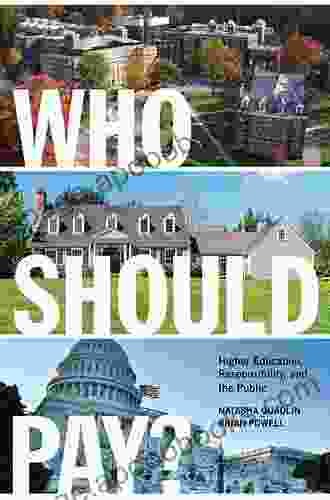Who Should Pay for Higher Education: The Responsibility of Individuals and the Public

The cost of higher education has been rising steadily for decades, and shows no signs of slowing down. In the United States, the average cost of tuition and fees at a four-year public college has increased by more than 250% since 1985, and at a four-year private college by more than 150%. This has made it increasingly difficult for students to afford a college education, and has led to a sharp increase in student debt.
The rising cost of higher education has had a number of negative consequences. It has made it more difficult for students from low-income families to attend college, and has contributed to the widening gap between rich and poor in the United States. It has also made it more difficult for students to repay their student loans, and has led to a number of defaults.
4.3 out of 5
| Language | : | English |
| File size | : | 4708 KB |
| Text-to-Speech | : | Enabled |
| Screen Reader | : | Supported |
| Enhanced typesetting | : | Enabled |
| Word Wise | : | Enabled |
| Print length | : | 178 pages |
The question of who should pay for higher education is a complex one. There are a number of different stakeholders involved, including students, parents, taxpayers, and employers. Each of these groups has a different perspective on the issue, and there is no easy answer.
In this paper, we will explore the different arguments for and against public funding of higher education. We will also discuss the potential consequences of different funding models.
Arguments for Public Funding of Higher Education
There are a number of arguments in favor of public funding of higher education.
* Higher education is a public good. A college education benefits not only the individual who receives it, but also society as a whole. College graduates are more likely to be employed, earn higher salaries, and be involved in their communities. They are also more likely to vote and volunteer. * Public funding can help to level the playing field. Students from low-income families are less likely to attend college than students from wealthy families. Public funding can help to make college more affordable for these students, and can help to ensure that they have the same opportunities as their more affluent peers. * Public funding can help to promote economic growth. College graduates are more likely to be employed and earn higher salaries. This can lead to increased tax revenue and economic growth.
Arguments Against Public Funding of Higher Education
There are also a number of arguments against public funding of higher education.
* Higher education is a private good. A college education primarily benefits the individual who receives it. Therefore, it is argued that individuals should be responsible for paying for their own education. * Public funding is too expensive. The government already spends a significant amount of money on higher education. Increasing public funding would require raising taxes or cutting other programs. * Public funding can lead to lower quality education. When the government is the primary funder of higher education, it can have a negative impact on the quality of education. This is because the government may be more interested in controlling the content of education than in providing a high-quality education.
Potential Consequences of Different Funding Models
The decision of who should pay for higher education is a complex one. There are a number of different funding models that could be adopted, and each model would have different consequences.
Increased public funding. Increasing public funding for higher education would make it more affordable for students to attend college. This could lead to increased enrollment and graduation rates, and could help to level the playing field for students from low-income families. However, increasing public funding would also require raising taxes or cutting other programs.
Decreased public funding. Decreasing public funding for higher education would make it more difficult for students to afford college. This could lead to decreased enrollment and graduation rates, and could widen the gap between rich and poor. However, decreasing public funding would also free up tax revenue that could be used for other programs.
Increased private funding. Increasing private funding for higher education could help to make college more affordable for students. However, it could also lead to a decrease in the quality of education. This is because private donors may be more interested in controlling the content of education than in providing a high-quality education.
Decreased private funding. Decreasing private funding for higher education could make it more difficult for students to afford college. However, it could also lead to an increase in the quality of education. This is because the government would be more likely to focus on providing a high-quality education if it were the primary funder of higher education.
The question of who should pay for higher education is a complex one. There are a number of different stakeholders involved, including students, parents, taxpayers, and employers. Each of these groups has a different perspective on the issue, and there is no easy answer.
In this paper, we have explored the different arguments for and against public funding of higher education. We have also discussed the potential consequences of different funding models.
Ultimately, the decision of who should pay for higher education is a political one. It is up to each country to decide how it wants to fund its higher education system. There is no right or wrong answer, and the best solution will vary from country to country.
4.3 out of 5
| Language | : | English |
| File size | : | 4708 KB |
| Text-to-Speech | : | Enabled |
| Screen Reader | : | Supported |
| Enhanced typesetting | : | Enabled |
| Word Wise | : | Enabled |
| Print length | : | 178 pages |
Do you want to contribute by writing guest posts on this blog?
Please contact us and send us a resume of previous articles that you have written.
 Book
Book Novel
Novel Page
Page Chapter
Chapter Text
Text Story
Story Genre
Genre Reader
Reader Library
Library Paperback
Paperback E-book
E-book Magazine
Magazine Newspaper
Newspaper Paragraph
Paragraph Sentence
Sentence Bookmark
Bookmark Shelf
Shelf Glossary
Glossary Bibliography
Bibliography Foreword
Foreword Preface
Preface Synopsis
Synopsis Annotation
Annotation Footnote
Footnote Manuscript
Manuscript Scroll
Scroll Codex
Codex Tome
Tome Bestseller
Bestseller Classics
Classics Library card
Library card Narrative
Narrative Biography
Biography Autobiography
Autobiography Memoir
Memoir Reference
Reference Encyclopedia
Encyclopedia Deepa Kumar
Deepa Kumar Matthew Zapruder
Matthew Zapruder Moaml Mohmmed
Moaml Mohmmed Matson Taylor
Matson Taylor Meredith Summers
Meredith Summers Molly Green
Molly Green Molly Lacroix
Molly Lacroix Nate Procrasti
Nate Procrasti Melodie Winawer
Melodie Winawer Max Alina
Max Alina Mimi Kirk
Mimi Kirk Peter Hoekstra
Peter Hoekstra Sandy Cowen
Sandy Cowen Mark Gimenez
Mark Gimenez Muriel Spark
Muriel Spark Michael Crichton
Michael Crichton Tom Shelby
Tom Shelby Monique Orgeron
Monique Orgeron Matt Brown
Matt Brown Steven Hubbell
Steven Hubbell
Light bulbAdvertise smarter! Our strategic ad space ensures maximum exposure. Reserve your spot today!

 Richard SimmonsThe Origins of the Great Leap Forward: A Historical Journey into China's Most...
Richard SimmonsThe Origins of the Great Leap Forward: A Historical Journey into China's Most... Alfred RossFollow ·18.9k
Alfred RossFollow ·18.9k Herbert CoxFollow ·19.8k
Herbert CoxFollow ·19.8k Edmund HayesFollow ·14.3k
Edmund HayesFollow ·14.3k Theo CoxFollow ·13.3k
Theo CoxFollow ·13.3k Neil GaimanFollow ·19k
Neil GaimanFollow ·19k John GrishamFollow ·17.5k
John GrishamFollow ·17.5k Tim ReedFollow ·10k
Tim ReedFollow ·10k Bobby HowardFollow ·7.2k
Bobby HowardFollow ·7.2k

 Ben Hayes
Ben HayesJourney into the Verdant Realm of "Plants vs. Zombies:...
Immerse Yourself in an Epic Battle for...

 Edward Reed
Edward ReedUnveiling the Allure of Modish Crochet Hats Annie...
In the realm of fashion and...

 Jaylen Mitchell
Jaylen MitchellHalf Moon Bay: An Unforgettable Adventure Awaits in Aj...
Prepare yourself...

 Dan Brown
Dan BrownUnleash the Plant-Powered Apocalypse: Dive into Paul...
Prepare yourself for an epic showdown where...

 Efrain Powell
Efrain PowellStolen Summer: Nora Sommer's Enthralling Caribbean...
Escape to a World of...

 Steven Hayes
Steven HayesPlants vs. Zombies: Lawnmageddon - The Ultimate Battle...
Prepare for the ultimate battle between plants...
4.3 out of 5
| Language | : | English |
| File size | : | 4708 KB |
| Text-to-Speech | : | Enabled |
| Screen Reader | : | Supported |
| Enhanced typesetting | : | Enabled |
| Word Wise | : | Enabled |
| Print length | : | 178 pages |










